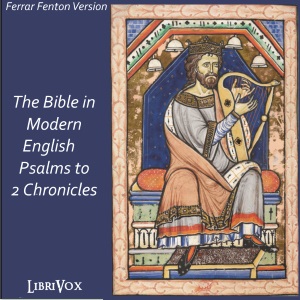
The Holy Bible in Modern English, commonly known as the Ferrar Fenton Bible, was one of the earliest translations of the Bible into “modern English” (i.e., English as spoken and written in the 19th and 20th centuries).
Work on the translation was begun in 1853 by a London businessman named Ferrar Fenton (1832–1920). The complete Bible was first published in 1903, though parts were published as separate volumes during the preceding 11 years. Fenton spent approximately fifty years working on his translation, with his sole goal ‘to study the Bible absolutely in its original languages, to ascertain what its writers actually said and thought’. Fenton had acquired a great learning and understanding of ancient Sanskrit, Greek, Hebrew and Latin through being a distinguished member of the Royal Asiatic Society. As a tradesman he also had access to numerous ancient Septuagint and Masoretic manuscripts to aid in his translation, and he also used Brian Walton’s Polygot Bible (1657) for minimal referencing.
The translation is noted for a rearranging of the books of the Bible into what Fenton believed was the correct chronological order. In the Old Testament, this order follows that of the Hebrew Bible. The name of God was translated throughout the Old Testament as “The EVER-LIVING”, but to a lesser degree as “LORD” and to a much lesser degree as “JEHOVAH” (such as in Numbers chapter 15). The Bible is described as “translated into English direct from the original Hebrew, Chaldee, and Greek languages.”
Notable as well, is Ferrar Fenton’s restoration of the Psalms into the musical verse form as close to the original as he could get. The Psalms were, quite literally, songs, complete with instructions for the “choirmaster” as well as descriptions of the appropriate musical instruments to be used. Today Psalm 48, Psalm 137, and Psalm 23 are still sung in churches, albeit to tunes not the original. Summary by Wikipedia.

Other Audiobook
Audiobook: Celebration of Dialects and Accents, Vol 1 (The North Wind and the Sun)
A celebration of all the wonderful dialects and accents found within the LibriVox community! The
Audiobook: In Vino Veritas, from Stages on Life’s Way
In Vino Veritas is one section of Kierkegaard’s Stages on Life’s Way, originally published in
Audiobook: Statement of Stella Maberly
From childhood Stella Maberly has been violently wilful and jealous, yet certain of her own
Audiobook: Von der Unerschütterlichkeit des Weisen (De Constantia Sapientis)
Unverwundbar ist nicht Das, wogegen kein Schlag geschieht, sondern, Was nicht verletzt wird. Das ist
Audiobook: Popular History of Ireland, Book 01
Thomas D’Arcy McGee was an Irish refugee and a father of the Canadian confederation. His
Audiobook: Group of Famous Women
It is a remarkable fact that little attention, if any, has been given to the
Audiobook: Vertical City
As the city above soars gloriously skyward, the denizens of the city writhe in its
Audiobook: Henry Dunbar
In this novel by Victorian sensationalist Mary Elizabeth Braddon, Henry Dunbar returns to England after
Audiobook: Lot No. 249
Abercrombie Smith, Edward Bellingham and William Monkhouse Lee are three students at Oxford University, sharing
Audiobook: Right Ho, Jeeves
If you’re encountering the zany Bertie Wooster and his exceptionally astute Man Friday, Jeeves, for
Audiobook: Narraciones inquietantes
Recopilación de cinco relatos de cinco maestros: Charles Dickens, Edgar. A. Poe, Alexandre Dumas, Pedro
Audiobook: Oscar Wilde Calendar
A compendium of Oscar Wilde’s wit, including some of his most famous epigrams as well